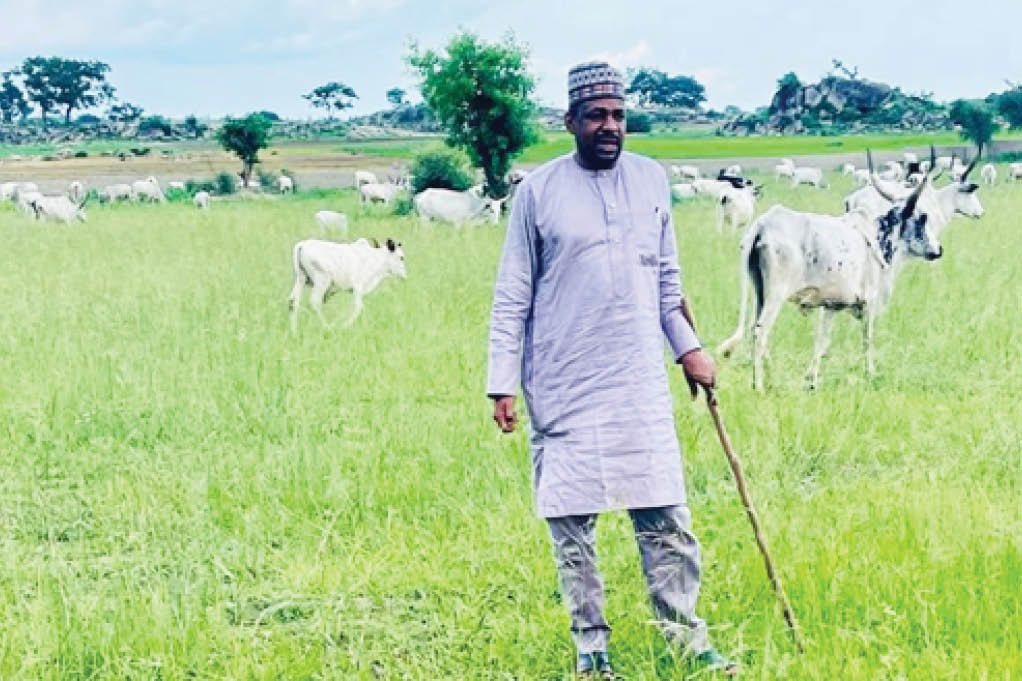With 50 cows 20 years ago, I now have 1,000
Idris Isa Bawa, an architect, resisted giving up on livestock husbandry despite the enormous obstacles he faced. Beginning from his university years, Bawa was determined to become a livestock farmer, a desire that was firmly rooted in his inheritance, determination and the desire to succeed. Bawa told Daily Trust that his livestock business began 20 […]

Bawa
Idris Isa Bawa, an architect, resisted giving up on livestock husbandry despite the enormous obstacles he faced.
Beginning from his university years, Bawa was determined to become a livestock farmer, a desire that was firmly rooted in his inheritance, determination and the desire to succeed.
Bawa told Daily Trust that his livestock business began 20 years ago with about 50 cows. However, the journey started while in the university in the 1990s using part of the scholarship he got from the federal government to raise cows.
“I am actually into general cattle breeding, both dairy and fattening. I am so much motivated into dairy and general breeding because it is something I personally have passion for. It is an occupation I inherited from my parents and feel I should not abandon but rather improve on to ensure more productivity. I actually started a serious animal husbandry business since 1990s when I was in the university,” he narrated to Daily Trust on Sunday.
- Why organisations should priortise mental health in workplaces – Pension operators
- NCAA alerts airline operators over fuel contamination incidents
As the saying goes—that experience is the best teacher—the farmer said he had made so many mistakes, but instead of allowing them to kill his dreams, he decided to learn from them and move on.
“When I look into how I started, I see so many mistakes in the past, which I have learned and corrected over time. I actually started with a small scale, but with determination I am being able to grow to an appreciable level,” he said.
In a period where feed is a critical issue with livestock farmers in the country, Bawa said he had to devise a means to deal with the situation that has forced many to shut down.
“I am able to solve that problem by ensuring that I deliver affordable means of providing feeds to my animals. In my farm you will not only see animals, you will also see crop farms like maize, rice and others. The residue of these crops, the by-products are usually stored after harvest and used for feeding of my animals throughout the dry season. This has really helped me over the years in attending to the feeding issues encountered by many pastoralists. Also, I try to raise some special breeds of grasses to support the natural one we have in the area, although it has its own challenges in terms of watering them during the dry season, considering the savannah nature of the area in Bauchi State,” he explained.
Today, Bawa’s farm (Baraji Integrated Farms and Ranches Ltd) has a capacity of about 400 hectares of land with a population of about 1,000 cows. This is, however, just about 40 per cent of what he wants to achieve. The breed of animals he has are mostly white Fulani cows.
His choice was deliberate because, according to him, the white Fulani breeds have the “ability to withstand the long dry season of the area.”
The farmer explained that growth had not been as expected because of the issue of funding, which is actually a major challenge.
“Lack of funding resulted in taking me over 20 years to reach where I am today. I have not reached 40 per cent of where I want to be. I wish the government at different levels would come out with a good enabling environment to support farmers, especially pastoralists. This will go a long way to provide employment opportunities to many unemployed youths in the country,” he stated.
But funding is not the only major issue for the farmers. There is lack of government support to building their capacity to increase knowledge on good practices. Others include the issue of climate change, animal diseases, ever increasing cost of feeds, cattle rustling and general insecurity.
Bawa advised the government to take “measures to improve animal production, both dairy and fattening. This will go a long way towards solving so many problems in the country, especially at the rural level. Farmers can be settled in clusters and the government would provide all the needed support in terms of facilities and enabling markets for farmers to be able to raise their animals and easily sell their products to make a living.”
